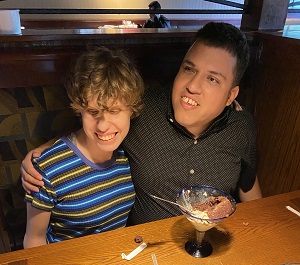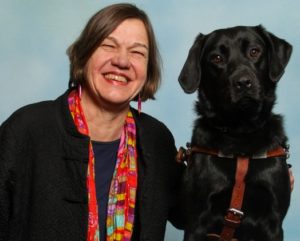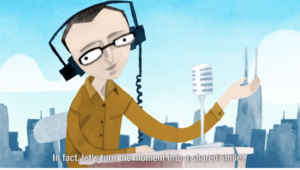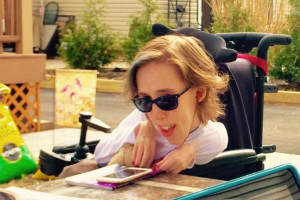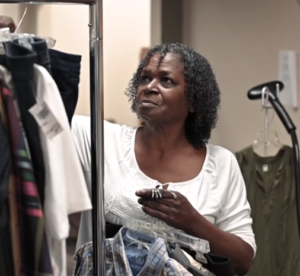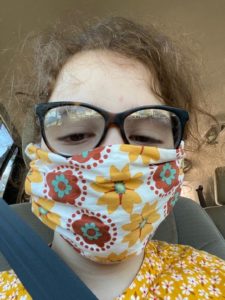by Team Easterseals
 Ben Trockman is the Diversity and Inclusion Outreach Specialist at Old National Bank, a long time leader in the Easterseals community, and an ambassador. He shares with us his thoughts on National Disability Employment Awareness Month and why companies must include disability in their diversity and inclusion efforts.
Ben Trockman is the Diversity and Inclusion Outreach Specialist at Old National Bank, a long time leader in the Easterseals community, and an ambassador. He shares with us his thoughts on National Disability Employment Awareness Month and why companies must include disability in their diversity and inclusion efforts.
What is your current position at Old National Bank? Did I hear you have another job as well? Describe your position and how your disability has or has not played a role in your career development.
Which job should I describe? My career as a Diversity and Inclusion Outreach Specialist at Old National Bank (ONB), or my job as a Councilman in the City of Evansville!? (He said with a smile)
At ONB, I serve as a Diversity and Inclusion Outreach Specialist, where I work to create a more inclusive atmosphere for people with disabilities both within our company and the communities we serve.
I run point on Achieve Ability, a program that pairs aspiring professionals with disabilities with leaders at ONB for a 10-month mentoring relationship. Our goal with Achieve Ability is to empower people with disabilities through a deep and meaningful relationship with a leader at Old National Bank.
Yep, that’s right, I’m also an elected official! I’ve always been interested in local government. I’m also an incredibly competitive person. So, when the opportunity presented itself to run for a City Council position – I was in. Not only am I able to utilize my passion for advocacy to benefit the people of the First Ward (whom I represent) I was able to harness my competitive nature to beat the other guy in the election!
I certainly wouldn’t be in my career in the Diversity, Equity, and Inclusion space without the experience of my disability. But, I’m certain the obstacles and opportunities I’ve experienced as a person with a disability has served as a positive attribute to help our company become more inclusive.
And, as a person with a disability, I’ve learned that advocacy is crucial to make progress, but also to be able to survive. I’ve advocated for inclusion at the Statehouse in Indiana, and with lawmakers in Washington DC. Therefore, I believe my disability has naturally made me – I think – into a better and stronger advocate for myself and the people I serve in the First Ward as a Councilman.
What is National Disability Employment Awareness Month (NDEAM)? Why is NDEAM important?
National Disability Employment Awareness Month is the time to promote inclusion of people with disabilities in the workforce. It is the best time of the year to share success stories, demystify myths, and inspire companies and their leaders to become more inclusive.
For the employer community, some can brag about how inclusive their workforce is already, and some can utilize this month to learn from the leaders in the industry by reading stories and attending webinars. The best and most inclusive minded employers, they use this month to share their best practices while learning additional ways to double down on the progress they’ve already made.
For the disability community, it’s a time to reflect on how far we’ve come, but also collaborate and push to make even more progress. It’s a time to share your story and use your voice for good.
What are some of the best things about hiring people with disabilities? Why should companies consider this untapped market?
We are problem solvers.
We navigate a world that was not created for us. Whether that’s as a person in a wheelchair trying to access public transportation, or a person with a visual impairment trying to complete online assessments. We have found a way to do and accomplish, each and every day. We are resilient.
As a manager, wouldn’t you want to employ problem solvers? Creative minds? I sure would!
Why is disability inclusion in the workforce crucial?
As 1/5 of the world’s population, and at a time when there are more job openings then there are candidates to fill them, employers should realize that people with disabilities, those who they might have counted out for certain positions previously can and will make a meaningful contribution.
We are fathers, daughters, and nieces. We are travelers, customers, and teammates. We are a large part of society that understands adversity. If you include us, we will help you solve problems, we will help you better connect to potential clients, and we will welcome you in as friends and family.
If you’re not including people with disabilities in your workforce, you’re missing a customer. You’re missing a contributor. You’re missing a relationship that could change the way you operate.
Can you talk about the importance of self-advocacy in life, in the workplace, and while on the job hunt?
Our society is not entirely trained to work with and understand people with disabilities. We do life a little differently. So, we must be our own advocates to teach others about what we need to be successful.
As a personal example, in life I must advocate my needs to my caregivers, whether family, friends or a home healthcare worker. I must kindly instruct them to scratch my nose, to check if a shoe is put on correctly, or how to properly restart my computer after it crashes. It happens! It’s advocacy.
While on the job, I find myself teaching my manager and coworkers about what life is like for a person with a disability. What I can’t do. What I can do. Yes, I sure can do that, boss. We live in a society that generally makes assumptions about people’s capabilities, whether you have a disability or not. Luckily, I work for a very empathetic manager and company, but I know that doesn’t happen everywhere.
Whether it’s personal or professional, you must speak up, and be a strong advocate. Because, if you don’t, you might get a pressure sore on your foot where your toe was curled under but didn’t feel it. If you don’t, then you won’t get the appropriate assistive technology you need to be successful on the job.
The life of a person with a disability is a life of an advocate.
What is your advice to a person with a disability who is seeking employment and is concerned about facing ableism while on the job hunt?
Be you. Be bold. If the employer doesn’t accept you for who you are – you don’t want them anyway.
There has been an equality reckoning in the last decade, specifically in the last three years. Companies are committing time and resources to diversity, equity, and inclusion (DEI) – and it’s transformational. If you’re applying to a company that doesn’t have a DEI focus, then you’re looking at the wrong company!
Now more than ever you have the power to seek a quality company. You have the power to prove your abilities. Be you and everything else will fall into place.
How do you think the pandemic has affected the employment status of people with disabilities? Is there a silver lining here?
There is absolutely a silver lining. Society now fully accepts virtual meetings!
That means that a sarcastic, passionate quadriplegic from Indiana can participate in a business development call with a potential partner in Minnesota – no questions asked. True story!
Prior to the pandemic, there is no way I would be asked to handle business development relationships, as the old school rule was coffee, lunches, and dinners. Lots of travel. Now, one of my colleagues can be in a room 2000 miles away visiting with a lovely not-for-profit, while I’m up on the big screen making jokes. It’s a new way of developing relationships and is tremendously beneficial for people with physical disabilities. The travel nightmare is no longer such a serious detriment to fulfilling my career.
Overall, employers have realized that remote work works. As we know, people with disabilities – specifically those with mobility challenges – have issues with access to reliable transportation and in many cases reliable caregivers. Therefore, it can be a difficult task to travel to work as consistently as an able-bodied human. Sometimes caregivers get sick. Sometimes caregivers don’t show up. Life happens.
My employer, Old National Bank has been incredibly flexible with me throughout the pandemic. I’ve been able to work at home when I needed, and that’s been life changing. ONB’s flexibility has even included times when my home health crew was sick or was a close contact. The flexibility of remote work has made it easier for me – and many others – to continue to participate fully in my duties at ONB.
Heck, even the Evansville City Council adopted a policy for remote meetings!
Can you tell me a bit about your relationship with Easterseals?
I wouldn’t be where I am today without Easterseals!
Not only have I used Easterseals for physical therapy since my injury, which has kept me healthy and motivated, I had a life-changing experience as a National Ambassador for Easterseals in 2012.
As an ambassador, I traveled across the US to advocate on behalf of Easterseals, and people and families of those with disabilities. It was a lesson in public relations that I wouldn’t soon forget. At a time when I was still in college, figuring out what I wanted to do with my life, this experience helped me realize I wanted to be in a position of advocacy, and a role that worked to influence people positively.
I certainly wouldn’t be my role at Old National Bank without Easterseals, and I likely may not have pursued a career in local government without the advocacy experience with Easterseals.
Speaking of jobs, during my ambassadorship, I created a nice bond with the public relations team at Easterseals. They realized a public relations job would be a nice fit before I had my public relations epiphany. After I completed my studies in PR & Advertising at the University of Southern Indiana, Easterseals offered me a summer internship in the PR department. The relationship came full circle!
I also served on the board of Easterseals Southwestern Indiana from 2012-2018.
So, what’s my relationship? I’d say Easterseals is in my DNA.
What do you want the world to know about working with and hiring people with disabilities?
We can be great managers, great employees, and great friends. Just like anyone else!
Most importantly, don’t be afraid to ask questions. Most people with disabilities are willing to answer even the “silly questions.” I would so much rather someone ask a question and learn – whether it’s an easy answer or a complicated one – then have someone walk away just wondering.
Ask questions. Engage. Collaborate. We are just like anyone else trying to be successful in the world!
 Tonight, Thursday, November 18, 2021, I will be one of four women with disabilities on an hour-long free Zoom panel sponsored by the Skokie Public Library:
Tonight, Thursday, November 18, 2021, I will be one of four women with disabilities on an hour-long free Zoom panel sponsored by the Skokie Public Library:






